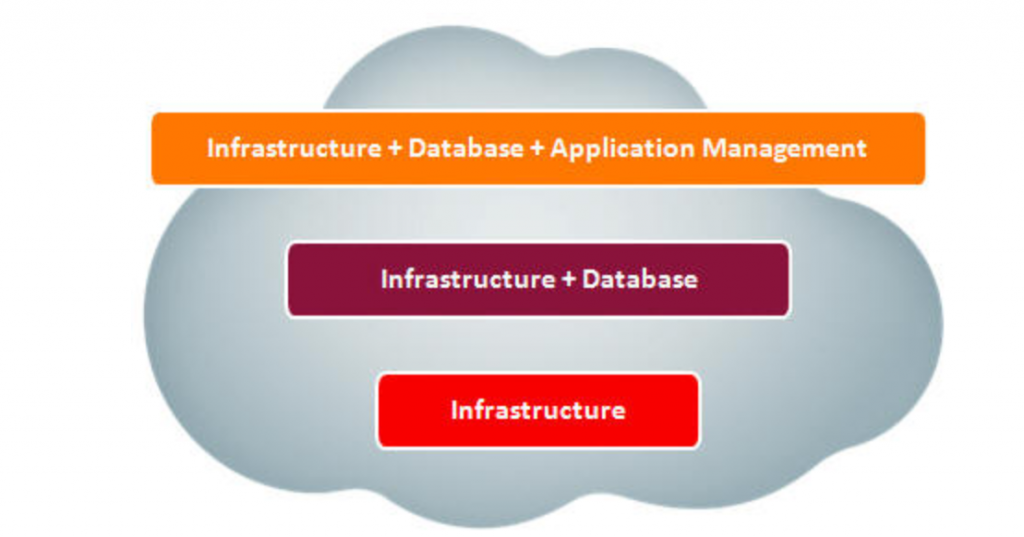One of the paths companies can choose to be in the Cloud, is running Oracle EBS on OCI (Oracle Cloud Infrastructure). This is also known as Infrastructure as a Service or IaaS. Unlike SaaS (Software as a Service), with IaaS, you subscribe to IaaS and keep ownership of your Oracle EBS, and you keep full responsibility for maintaining your own instances.
According to Cliff Godwin, SVP of Application Development at Oracle, Oracle EBS on the Oracle Cloud refers to running the same EBS applications you are currently running but running them on a combination of Oracle’s Iaas and PaaS offerings, so specifically you are running on Oracle’s compute cloud and the database cloud service component of the Oracle platform.
An important thing to note here, is that you could choose to run your Oracle EBS on other Cloud Solutions like Amazon Web Services and Microsoft Azure, but Oracle has no plans for testing Oracle EBS on any other cloud solution that is not its own, so compatibility information is not available.
MAIN OPTIONS AND SERVICE LEVELS FOR ORACLE EBS ON OCI:
- Infrastructure: As part of IaaS, Oracle Compute Cloud Service provides a highly scalable, competitively priced compute capacity that you can use to host your application tier and, optionally, your database tier.
- Infrastructure + Database: The Database Cloud Service part of PaaS can be used to run your database tier, enabling you to provision your chosen database configuration quickly and easily.
- Infrastructure + Database + Application Management: You can get assistance with Oracle EBS applications and database management by deploying managed services on top of the infrastructure and platform services:
- Oracle Managed Cloud Services (OMCS) manages your Oracle EBS environment on Oracle Cloud. The complete lifecycle management provided by this service includes patching, cloning, and regular technical and functional updates, along with an industry-leading application availability service level agreement.
- Alternatively, you can choose a cloud partner, like ITC, to run your applications and perform routine applications DBA tasks, as well as developing and maintaining your customizations and integrations where applicable.

KEY BENEFITS OF ORACLE EBS ON OCI
You can think of running Oracle EBS on Oracle Cloud as running exactly the same EBS applications that you run on premises in your data center today—the same applications you may have customized, and it also looks the same for users.
Some of the other benefits that come from running your Oracle EBS on OCI are:
- Reduce overall infrastructure costs and manage them more easily
- OCI offerings are elastic and allow IT to scale up or scale out the infrastructure on demand. This provides greater business agility and reduces the need for upfront capital expenditure.
- Allocate infrastructure temporarily for non-continuous activities such as:
- Proof of concept testing
- Functional and technical testing
- User training
- Customization development
KEY DEPLOYMENT CONSIDERATIONS OF ORACLE EBS ON OCI
Before you attempt a cloud migration of Oracle EBS, is important to consider the following:
- Oracle EBS Releases 12.2 (12.2.3 and later) and 12.1.3 are certified to run on OCI.
- Oracle EBS cloud deployments require a subscription to a cloud service of your choice. You can also subscribe to optional database services designed to cater for your specific requirements.
- Automation is provided for a selection of deployment and management scenarios. These automation capabilities are continually being extended and enhanced.
- Before you perform an implementation of Oracle EBS on OCI, you must purchase the requisite product licenses via your Oracle sales representative or the Oracle Store. Oracle customers who already own Oracle E-Business Suite licenses may use the Oracle Cloud to host instances of their applications.
- In terms of customizations, you can use the same Oracle tools you use within your on-premise data center are available on the cloud in order for you to customize or extend your Oracle E-Business Suite systems.
*In the case of older releases (such as 11i and 12.0), while any workload that you can run in a certified on-premises environment can also run in Oracle Cloud, it is recommended that you upgrade to the latest version, for reasons that include the following:
- Oracle EBS Releases 11i and 12.0, are all under Sustaining Support, which means that no new fixes will be provided.
- Oracle EBS Releases 12.1.1 and 12.1.2 do not meet the minimum requirements for creation of one-off patches or other fixes.
REQUIREMENTS TO RUN ORACLE EBS ON OCI
In order to run your Oracle EBS on OCI, you will need cloud resources like CPU, memory, and storage, comparable to your existing on-premise resources.
If you want to know the minimum recommended resources for a given scenario you can find information here: Document 2438928.1.
TAKING THE NEXT STEP
ITC can help you define your ERP Modernization roadmap plan. We provide unbiased advice to determine the best roadmap for you, whether that is upgrading your On-Prem E-Business Suite, migrating to Cloud SaaS applications or going with a Coexistence (Hybrid) model. Our assessment methodology takes into account your current business processes and IT footprint, to establish the effort and fit of these options and ultimately, recommend a clear path to innovation.
Request our assessment and take things at your own pace.

